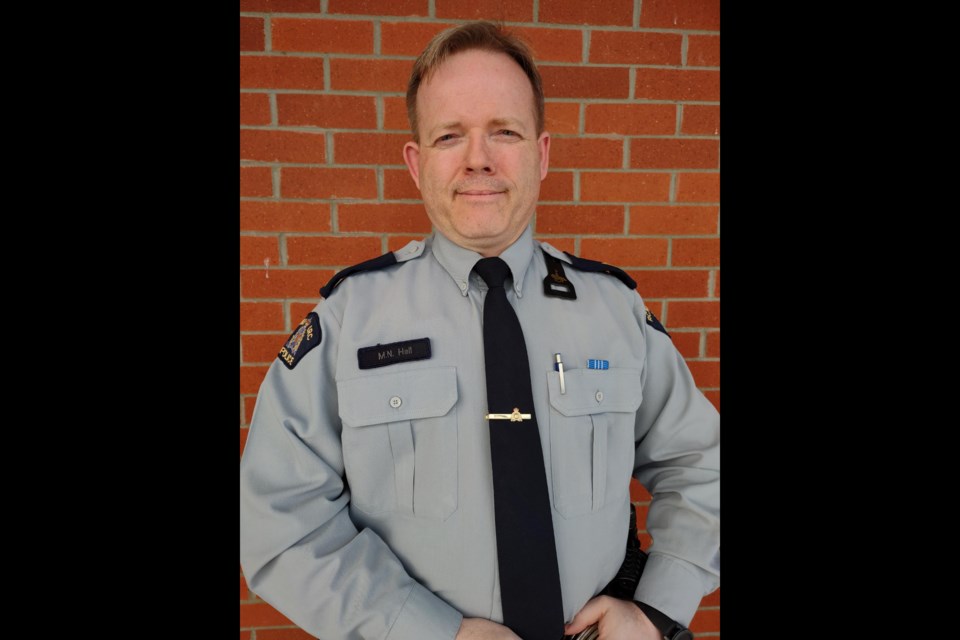ATHABASCA – It takes a series of small steps to make big changes, and with the help of the residents of the communities within the Athabasca RCMP Detachment’s coverage area, newly transplanted Staff Sgt. Mark Hall says he is more than ready to take those steps.
Hall took on his new assignment as commanding officer at the beginning of September, coming via the Peace Country where he most recently served as top cop in McLennan and before that he roamed the long, open highways of northwest Alberta with RCMP traffic services, based out of Peace River.
He’s actually a born and bred Albertan, raised in Didsbury, and has spent his entire law enforcement career in the province. His first position was in Wetaskewin, where he spent three-and-a-half years in traffic services, before transferring to Andrew, a satellite office of the Two Hills detachment, for another five. Then it was back to traffic in Stettler, before the opportunity to promote to Peace River arose, which he was happy to take.
“I wanted to go back into traffic services because I really found a niche for dealing with road safety, dealing with impaired drivers, travelling criminals, things like that. I really found a niche for that side of things. I've got to be honest, I'm not a fan of writing tickets, but it is part of the job,” he said Dec. 1 in an interview from behind his new desk at the detachment.
His first impressions of Athabasca aren’t actually recent, as he remembers passing through the community and being in the area quite a bit when he patrolled Highway 63, but it was those first impressions that are part of why he wanted to come to Athabasca.
“On the personal side, it's been fantastic. I love the community. I have a wife and daughter in high school and it's been fantastic. The community's been very friendly; it's exactly what I expected … We love it here. The school has been fantastic, and the community has been great to us,” he said.
“On the work side, it's been challenging, 100 per cent challenging. It's a lot more challenging than the last post I was at, which was a small detachment, but I gotta say that the community has been very supportive of my detachment, of me, and I have no complaints. It has been going really well.”
One of the first challenges arose as he was preparing for his first day on the job in early September, on the heels of an officer-involved shooting in Calling Lake, which, while the investigation is conducted by the Alberta Serious Incident Response Team (ASIRT), the local members directly involved, along with the rest of the detachment, are very much affected.
“My focus was on the members and making sure that they were looked out for because any highly serious incident can be traumatic, on anybody. When people see a uniform, all they see is a uniform sometimes, but these are people, these are moms and dads, and in some cases these are kids just coming out of high school,” said Hall.
With that he also noted, “This is a great detachment, the members here are some of the best I've seen, for a junior detachment, as it is. There's some of the best I've seen in the RCMP here and I'm pretty happy to be a part of it.”
The challenge of tackling crime is where those small steps come in to play, one of which is something Hall refers to a 360-approach.
For instance, for 2021, the Town of Athabasca asked for a focus on drug crime, along with those committed by the local unhoused population. While the RCMP will definitely play a large role in dealing with those issues, Hall also wants to look at solutions from all angles. That includes bringing in the appropriate agencies to help criminals turn their lives around.
“Policing definitely plays a big part in this; we need to intercept the drugs from coming into the community and we need to be able to address the people that are selling the drugs and things like that, but what happens after? As soon as we arrest these people and put them into the system, is there treatment there for them? Are they even being looked at, or are they being released back into our communities?” he said.
“So how do we stop it? We help the people that are getting addicted to the meth, to the drugs, and see if we can get them off of it. Get them into programs that will help them better their lives and eliminate the market for the drugs here. It's a big task, 100 per cent, a big task, and we may not change everybody along the way, but I think we need to start looking at it from that whole perspective. It's not just one department; it's not just addiction services that has to deal with the whole pie; and it’s not just policing that has to be dealing with everything. I think once we start looking at the person and helping the person, it will start having a bigger impact in the community.”
Hall pointed to a pilot program he oversaw at a previous post that targeted prolific impaired drivers — “the ones that will never seem to stop drinking, the ones who shouldn't be driving at all.” Just by offering the appropriate services at the time of their release, he found more of these chronic offenders would take up the offer, which led to some success.
“What we're looking at is to go past the enforcement side here and look at the bigger picture because these are people who make mistakes and get caught up in situations,” he said. “It's a small step, but for that person, that might be the biggest thing for them to start making life changes.”



